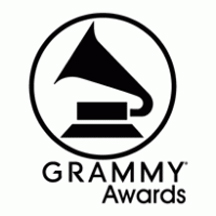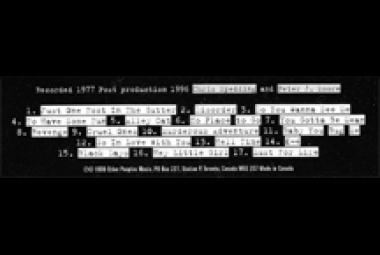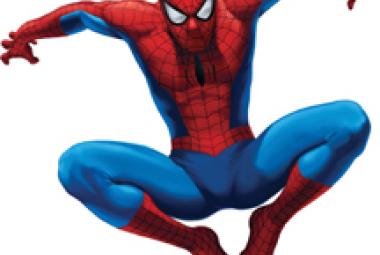A Grammy Award (originally called Gramophone Award), or Grammy, is an accolade by the National Academy of Recording Arts and Sciences (NARAS) of the United States to recognize outstanding achievement in the music industry. The annual presentation ceremony features performances by prominent artists, and the presentation of those awards that have a more popular interest. The first Grammy Awards ceremony was held on May 4, 1959, to honor the musical accomplishments by performers for the year 1958. Following the 2011 ceremony, NARAS overhauled many Grammy Award categories for 2012. (More from Wikipedia)
Country music and rockabilly artist Johnny Horton had a good streak of his own going with several “historical ballads”, beginning with “The Battle of New Orleans” in 1959; the song won the 1960 Grammy Award for Best Country & Western Recording. Horton continuing the following year with two more hits, “Sink the Bismarck” and “North to Alaska” (the latter being the theme song for the John Wayne movie called North to Alaska). There is no telling how much further Horton might have been able to take this craze had it not been for his tragic death in November 1960.
* * *
Tiny Tim’s albums were remarkably good; Allmusic gives his debut album, God Bless Tiny Tim four stars, and it features his takes on several classic tunes, some corny ghost stories, and other fun stuff. On his follow-up album, Tiny Tim’s Second Album, Tiny Tim posed with his parents; and his third album, For All My Little Friends (a collection of children’s songs), was nominated for a Grammy.
(March 2013)
* * *
In addition, Chuck Berry received the Grammy Lifetime Achievement Award in 1984 and was awarded the Kennedy Center Honors in 2000.
* * *
Bob Dylan (who was 17 at the time) attended Buddy Holly’s show on January 31, 1959 – only three days before the airplane crash. Dylan spoke of the concert during his 1998 Grammy acceptance speech for Album of the Year for Time out of Mind: “And I just want to say that when I was sixteen or seventeen years old, I went to see Buddy Holly play at Duluth National Guard Armory, and I was three feet away from him . . . and he LOOKED at me. And I just have some sort of feeling that he was – I don’t know how or why – but I know he was with us all the time we were making this record in some kind of way.”
(June 2013/1)
* * *
In 2005, Bill Miller’s instrumental album, Cedar Dream Songs won the Grammy Award for Best Native American Music Album. Miller also won four Native American Music Awards in 1999 and another in 2006. In all, Bill Miller has released 15 albums.
(August 2013)
* * *
The lead single “Fast Car” was a Top 10 hit in both the U.S. and the U.K.; and Tracy Chapman won a clutch of Grammies in 1989 also.
* * *
Melissa Etheridge had a memorable appearance at the 2005 Grammy Awards, where she performed “Piece of My Heart” in a tribute to Janis Joplin. She was slick bald at the time due to chemotherapy for breast cancer (from which she recovered); and the boldness of her appearance there – some years before Robin Roberts’ shorn locks on Good Morning America – only endeared her further to the American public.
* * *
Janis Ian might have remained a most remarkable one-hit wonder had she not taken up other controversial issues – as related by Wikipedia, “adolescent cruelty, the illusion of popularity, and teenage angst” – with her biggest hit song “At Seventeen” (1975). The song and the accompanying album, Between the Lines both reached #1 on the Adult Contemporary Singles and Hot 100 Albums Billboard charts, respectively, with much less drama than had befallen “Society’s Child”. What’s more, Janis Ian won the Grammy for Best Pop Vocal Performance – Female that year, beating out Linda Ronstadt (whose breakthrough album Heart Like a Wheel had been nominated), as well as Olivia Newton-John and Helen Reddy.
Peggy Lee won the Grammy Award for Best Female Pop Vocal Performance for “Is That All There Is?”, and the song was later inducted into the Grammy Hall of Fame.
“Somebody’s Knockin’” earned Terri Gibbs a Grammy nomination for Best Country Song, and the accompanying album, Somebody’s Knockin’ won the Academy of Country Music Award for Best New Country Artist and the inaugural Horizon Award (for an artist gaining new recognition) from the Country Music Association Awards. Terri Gibbs toured with George Jones and sang duets with him; she also performed at the Grand Ole Opry.
I have Terri Gibbs’ first album, Somebody’s Knockin’ – rated 4 stars by Allmusic – and every song is rendered well in her understated but expressive voice. Her follow-up single “Rich Man” made the Country Top 20, as did two later singles. Her 1987 album, Turn Around was also nominated for a Grammy and generated three hit singles on the CCM charts.
(July 2014)
* * *
Little Jan Buckner-Goff was inducted into the Southern Gospel Music Association Hall of Fame herself in 2010. After Wendy Bagwell’s death in 1996, Jerri Morrison no longer wanted to travel, but Little Jan still yearned to perform. Several of her songs have been nominated for Grammys, and she was named the Female Vocalist of the Year by the Southern Gospel Music Association on two occasions. Her song “Walk Around Me, Jesus” was the #1 song on the Cash Box Music Charts.
(November 2014)
* * *
In the mid-1990’s, Kim Fowley edited a video demo and went to 24 record labels trying without success to sign three young brothers who were in a band named Hanson. In 1997, Hanson got a major-label contract and had a worldwide hit, “MMMBop”; they also received three Grammy nominations that year.
(January 2015/1)
* * *
During the tributes to Glen Campbell at this year’s Grammy Awards and Academy Awards, it occurred to me that I am more of a country music fan than I usually let on to other people – or even to myself. Besides the June 2012 concert appearance by the Flaming Lips as part of their mini-tour to set the Guinness World Record for the largest number of concerts in a 24-hour period (and travelling by bus no less), the only live concerts that I have been to in the past four (maybe five) years are the “Queen of Rockabilly” Wanda Jackson in February 2013 and Glen Campbell in August 2011. The latter concert was at the IP Casino in Biloxi after he publicly acknowledged being afflicted with Alzheimer’s Disease and was a warm-up concert for Glen Campbell’s Goodbye Tour, which extended from August 31, 2011 through November 30, 2012. Part of the intention of the Goodbye Tour was to help ease the social stigma associated with Alzheimer’s and other forms of dementia.
Besides his long hit-making career and the requisite accolades – such as four Grammy Awards, three Grammy Hall of Fame Awards, and his induction into the Country Music Hall of Fame in 2005 – Glen Campbell also appeared in several major films, most famously the John Wayne movie True Grit (1969) that earned Campbell a Golden Globe nomination for Most Promising Newcomer.
Smokey Joe’s Café is a musical revue of early rock and roll songs that was largely based on Leiber/Stoller material; it opened on Broadway in 1995 and ran for more than 2,000 performances, making it the longest running musical revue in Broadway history. The original Broadway cast recording, Smokey Joe’s Cafe: The Songs Of Leiber And Stoller won the Grammy Award in 1996 for Best Musical Show Album. Smokey Joe’s Café had a run in London also.
* * *
Black Russian had some assistance with the lyrics, perhaps because English is not their native language; they hardly spoke the language at all at the time that they defected. Lyricists who lent a hand include Allee Willis, who co-wrote the lyrics for their beautiful first single “Leave Me Now”. Willis has had a long career as a writer, songwriter, set designer, and artist. Allee Willis was also one of the writers of the song by the Rembrandts, “I’ll be There for You” that was the theme song for the massively popular sitcom Friends and one of the best selling TV theme songs of all time. Willis won a Grammy Award in 1985 for Best Soundtrack for Beverly Hills Cop.
(April 2015/1)
* * *
From Wikipedia: “The [Chris Cornell] album proved commercially unsuccessful although the album’s single ‘Can’t Change Me’ was nominated for Best Male Rock Vocal Performance at the 2000 Grammy Awards. He also contributed the song ‘Sunshower’ (a bonus track on the Japanese release of Euphoria Morning) to the soundtrack of the 1998 film, Great Expectations; and a reworked version of the track ‘Mission’, retitled ‘Mission 2000’, was used on the soundtrack to the 2000 film, Mission: Impossible II.”
(April 2015/2)
* * *
(June 2015)
* * *















